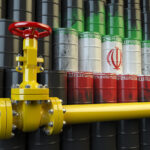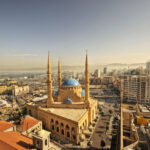(Oil & Gas 360) – A few days ago I returned from a trip in which we passed through London and I tacked on a few days there. As always, one of the best evenings was dinner and conversation with Lieutenant General Sir Simon Mayall.
Simon has a long personal and family history in the Middle East, was Operations Officer for British Forces in the Gulf War and recently had advisory and envoy roles for the Middle East to the British Government and Prime Minister.
Sir Simon has a new book out, The House of War. The title derives from how Islam refers to all non-Islamic areas of the world. The book presents a review of the great clashes and battles between Islam and Christianity over the past 1300 years. Certain patterns and principles for prevailing in the ongoing confrontations in the Middle East emerge. We are in such a period now and those principles can guide our actions.
We are in a precarious position in the Middle East. The focus of Israel’s Defense Forces has shifted from the confrontation with Hamas in Gaza to Israel’s northern border with Lebanon where Hezbollah has attacked Israel with missiles for months and displaced thousands of Israelis from their homes. Israel cannot tolerate this and has retaliated with strikes against Hezbollah, including killing its leader, his staff, and his replacement. Hezbollah situates itself among civilians so some of the Israeli strikes against Hezbollah also kills civilians.
Hezbollah represents Shiite Muslims in Lebanon and, as such, the military wing operates as a proxy for Iran. Iran funds and supplies Hezbollah. Recently, the Israeli confrontation Hezbollah escalated to direct missile attacks on Israel from Iran. The world now waits for the Israeli retaliation against Iran, which could expand into a major regional war with extensive civilian casualties, another major refugee crisis, and possible US involvement in support of Israel.
Lebanon is an unusual place in the Middle East. Its population includes Maronite Christians, Greek Orthodox Christians, Greek Catholic Christians, Sunni Muslims, Shiite Muslims, and Druze. It is a democracy but with so many sectarian groups it cannot form a majority to do anything. Lebanon has had no president or central administration for over two years. Its main source of funding is the United States.
The Lebanon Defense Force (LDF) is the military arm of the Lebanese government and seems to be the only arm of the government with civilian respect; its function is to prevent violence between the various sects of the population. The LDF, about 70,000 men, is funded and equipped mostly by the United States.
A third military group is the United Nations Force in Lebanon (UNFIL) which is over 10,000 UN peacekeeper troops from about 50 countries stationed along, and within 5 km of, the border between Lebanon and Israel, known as the Blue Line. Supposedly they are maintaining a de-militarized zone along the border. During recent Israeli strikes into Lebanon, Israeli tank fire injured Irish soldiers at an UNFIL base causing alarm in Ireland and Europe about Israeli action in the DMZ. Today, the Israelis showed the world the extensive Hezbollah deep tunnel system and arms caches in the DMZ. Obviously, the UNFIL people have not done their job – for a long time. They must think they are on holiday.
Lebanon historically considered itself a Western country. With all the turmoil and refugee movements it is not sure as to its identity but has strong ties to the West. At this point, the Iran – Israel conflict may destroy whatever economy and national identity it has left. The US is trying to calm the situation, asking the Israelis not to invade Lebanon with ground forces, sending more aid to Lebanon, and asking Israel not to attack Iran.
Broader considerations are that, with a diminishing US Middle East presence, Russia and China are expanding theirs. They are doing this directly and through growing Arab membership in the BRICS group. Russia will host a meeting of BRICS October 22 – 24 at which they will welcome five new members: The United Arab Emirates, Saudi Arabia, Iran, Egypt, and Ethiopia. Note that this includes three large oil producers and two US allies who are obviously hedging their bets on what future US policy and effectiveness will be. The group will discuss steps to take to replace the dollar as the reserve currency in international trade.
Another consideration is maintaining gas supplies to Europe. Europe is devoid of political will or initiative to take care of itself. Large gas resources in North Africa and the Eastern Med are available for development under a coordinated program to supply Europe and increase the prosperity of the producer countries. The US, with its experience in oil and gas development, can supply the expertise and leadership to lead this program but it needs to expand its presence in the Eastern Med.
The US now has a rare opportunity to assert itself with a surprise positive strategic move. The US should pre-emptively move into Lebanon with a large, overwhelming ground force in support of the Lebanese Defense Force and government as well as UNFIL to protect Lebanese civilians from a bloodbath. US forces would give the LDF the necessary backup strength to stop the cross-border fighting between Hezbollah and Israel, possibly avert a war between Iran and Israel, and maintain order as a new functioning Lebanese government is established.
Such a move would not only mitigate a pending war but would also re-establish US primacy in the region, disrupt Russian and Chinese plans to move in, give the US dominance in the Medilerranean, dispel the image of the US as a weak and declining power, undermine the upcoming BRICS conference, and convince the Saudis and UAE the US will support them, and generally assert US resolve.
Does the United States have the leadership to execute such a move? No.
The US continually tries to get Israel to agree to a one-way cease fire somewhere, anywhere without any agreement from the other side – an exercise in futility. Such a move needs to be executed quickly, boldly, and big. It must be a surprise and catch everyone off-guard. It requires bold, confident, decisive, leadership. The US is led by a doddering incompetent who was never right about anything with feckless subordinates and a Vice President who boasted she was able to find the Middle East on a map.
By Dr. Charles A. Kohlhass for oilandgas360.com/Industry Insights & Opinions








